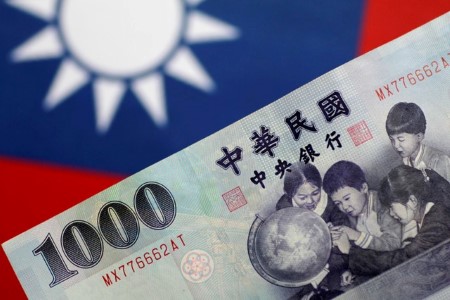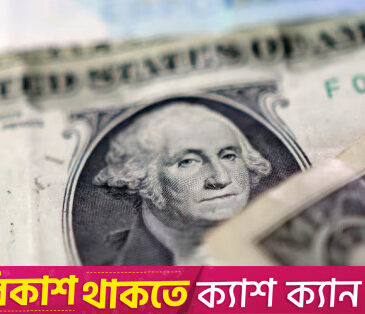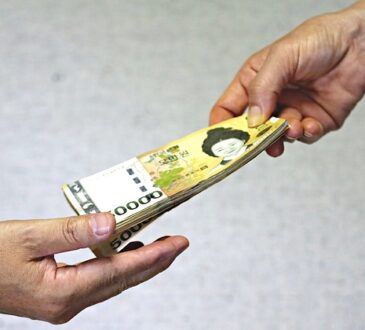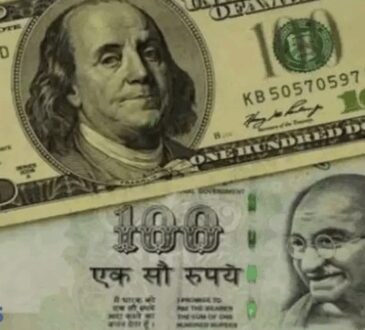
Taiwan dollar marks best day so far this year
Taiwan stocks surge more than 2%
Most Asian currencies set to end the week in red
Malaysia Q4 GDP +3.4% y/y – estimates
By Sameer Manekar
Jan 19 (Reuters) –Taiwanese stocks got a boost from a risk-on rally in the world’s largest contract maker TSMC on Friday, while the Taiwan dollar gained as investor focus shifted away from post-election turbulence.
Most other emerging Asian currencies clocked modest gains on Friday, but were however set to end the week on a sour note as traders rolled back their bets of an interest rate cut by the U.S. Federal Reserve in March, helping the dollar strengthen.
The Taiwan dollar TWD=TP appreciated 0.4% to mark its biggest daily gain since late December, while the main stocks index .TWII surged more than 2% to clock their best day since early November, fuelled by a 6% jump in Taiwan Semiconductor Manufacturing (TSMC) shares after a bullish outlook.
The Taiwan dollar, however, was on track to pencil in a near 1% loss over the week, its third consecutive week in the red, as post-election turbulence and geopolitical tensions with China pressured the currency earlier in the week.
“Anxiety regarding Northeast Asia geopolitical risks should ease to the relief of the TWD (Taiwan dollar), as China’s reaction to the Taiwan election result has been measured,” analysts at Bank of Singapore said.
“The market is likely to shift focus back to fundamental factors of a better semiconductor industry outlook and lower global yields, which is more likely to increase foreign flows and be supportive for the TWD over the medium term.”
Elsewhere in emerging Asia, the South Korean won KRW=KFTC firmed up to 0.5%, although for the week it was set to end 1.8% lower. Stocks in Seoul .KS11 gained as much as 1.6% for the day, but were on track for their third straight weekly loss of more than 2%.
In Singapore, the dollar SGD= ticked higher while shares .STI advanced 0.5%. Investors are now awaiting the Monetary Authority of Singapore’s first meeting of the year later this month, where the market widely expects it will keep its monetary settings unchanged.
Analysts at Maybank remain positive on the Singapore dollar in the medium-term, but added that the currency performance could “taper” as Fed begins to cut rates.
Other regional currencies such as the Indonesian rupiah IDR=, Thai baht THB=TH, Malaysian ringgit MYR=, and the Indian rupee INR=IN treaded water without direction. However, all currencies were poised to end the week in the red.
Equities in Thailand .SETI, Malaysia .KLSE, and India .NSEI advanced between 0.4% and 0.7%, while those in Indonesia .JKSE ticked lower.
Meanwhile, advance estimates showed the Malaysian economy likely grew faster in the December quarter than the prior three months, with the annual growth expected to come in at 3.8%, below the government’s projection of a 4% expansion.
Next week, Bank Negara Malaysia will meet for the first time this year to deliberate on monetary policy. Analysts widely expect the central bank to leave its policy rate unchanged.
HIGHLIGHTS:
** Indonesian 10-year benchmark yields slips 4.7 basis points to 6.626%
** Effect of the Philippine c.bank’s rate hikes since 2022 “quite significant” – senior c.bank official
** Thai PM: ‘digital wallet’ handout scheme may be delayed
** China’s Shanghai Composite Index .SSEC down 0.5% .SS
|
Asia stock indexes and currencies at 0432 GMT |
||||||
|
COUNTRY |
FX RIC |
FX DAILY % |
FX YTD % |
INDEX |
STOCKS DAILY % |
STOCKS YTD % |
|
Japan |
JPY= |
-0.10 |
-4.88 |
.N225 |
1.13 |
7.19 |
|
China |
CNY=CFXS |
0.00 |
-1.36 |
.SSEC |
-0.47 |
-4.79 |
|
India |
INR=IN |
-0.02 |
+0.08 |
.NSEI |
0.77 |
-0.48 |
|
Indonesia |
IDR= |
-0.06 |
-1.47 |
.JKSE |
0.15 |
-0.13 |
|
Malaysia |
MYR= |
+0.02 |
-2.65 |
.KLSE |
0.28 |
1.97 |
|
Philippines |
PHP= |
-0.20 |
-0.99 |
.PSI |
-0.09 |
0.85 |
|
S.Korea |
KRW=KFTC |
+0.23 |
-3.64 |
.KS11 |
1.07 |
-7.12 |
|
Singapore |
SGD= |
+0.14 |
-1.70 |
.STI |
0.32 |
-2.79 |
|
Taiwan |
TWD=TP |
+0.39 |
-2.26 |
.TWII |
2.44 |
-1.57 |
|
Thailand |
THB=TH |
0.00 |
-3.90 |
.SETI |
0.66 |
-2.03 |
Reporting by Sameer Manekar in Bengaluru; Editing by Raju Gopalakrishnan




